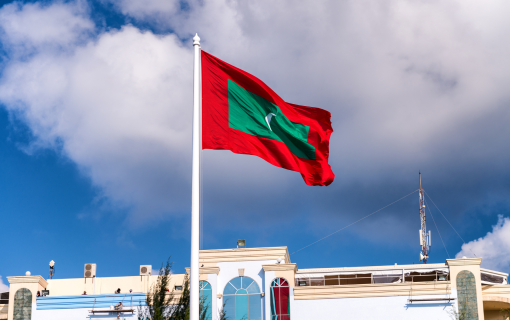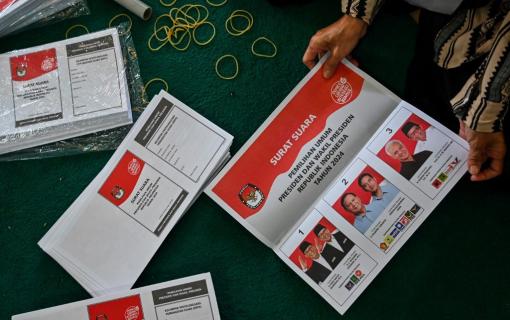UPDATED - Elections in Aceh: Another Step Forward
On April 9, Aceh, a special autonomous region of Indonesia located on the northern tip of the island of Sumatra, held the second set of provincial elections for the governorship since the end of the 30-year secessionist conflict with the government of Indonesia. These elections for governor, vice governor, district heads and deputy district heads are considered to be an important step for the region's continued reconstruction and democratization. Meredith Applegate, operations coordinator for IFES in Indonesia, answers some questions about these momentous polls.
How was the mood on Election Day?
After months of political and legal disputes, Election Day appeared to proceed fairly calmly here in Aceh. Polling stations opened at 8:00 a.m. and voters cast their ballots in what appeared to be a generally peaceful environment. While some minor incidents were reported throughout the day by local organizations, the impression gathered from observers tended to be generally positive and many praised the restraint and effort by all participants in contributing towards a peaceful election process.
Unfortunately, the 24 hours previous to Election Day were not as tranquil. There were reports of altercations between political parties, voter intimidation, the destruction of a polling station and even a short hostage situation. It is still unclear how much, if at all, this interfered with people casting their ballots.
How was turnout?
The Independent Electoral Commission of Aceh (KIP Aceh) reported there were a little over 3.2 million eligible voters in Aceh, and 9,786 polling stations throughout the province. From the polling stations we visited in Banda Aceh and Aceh Besar, turnout appeared to vary significantly from one location to another - some polling centers had almost all voters cast a ballot, while others appeared to have a somewhat lower turnout. Current estimates place turnout around 75 percent.
When can results be expected?
There is no electronic results system in place in Aceh, and KIP Aceh releases results only after they have been made official by the 23 regency-level KIPs, rather than releasing partial or unofficial results as they are being tabulated. KIP Aceh released official results on Tuesday, April 17, after a plenary meeting with district-level election commissioners, election supervisory officials, civil society and the public at the Aceh Legislature (DPR-A) building.
However, before official results were announced, two private survey firms had already conducted preliminary quick counts that indicated that Partai Aceh’s candidate for governor had taken a strong lead.
When were final results announced and what was the outcome?
On Tuesday, April 17, 2012, KIP Aceh officially announced the results of the Aceh gubernatorial election and confirmed the results for the 17 other mayoral and district elections. Partai Aceh candidate pair Zaini Abdullah and Muzakir Manaf won the gubernatorial election with 1,327,695 votes (55.87%).
Former governor Irwandi Yusuf received 694,515 votes (29.18%), and Muhammad Nazar came in third with 182,079 votes (7.65%). The other two independent pairs, Darni M. Daud and Teungku Ahmad Tajuddin, received 96,767 votes (4.07%) and 79,330 votes (3.33%), respectively.
Since Partai Aceh’s candidate pair managed to secure 55.87 percent of the vote, well above the 30 percent minimum requirement, a second round will not automatically be triggered.
However, it does appear that second round elections will take place in five of the 17 districts that held local elections last week: Aceh Barat Daya, Nagan Raya, Aceh Barat, Sabang and Langsa. No candidate pair in any of these locations appears to have won more than 30 percent of the vote. According to electoral regulations, these second round elections should take place no later than 60 days after the first round.
Electoral safety was a concern in the past election and some electoral violence was seen ahead of these polls. What measures are being taken to help mitigate electoral violence this time around?
Civil society and many other electoral stakeholders have prioritized making the elections in Aceh peaceful; however, sporadic instances of violence and intimidation have been reported in several districts, particularly during the months prior to Election Day.
Efforts to support peaceful elections in Aceh have targeted political parties, journalists, the public and other electoral stakeholders. To monitor and mitigate election-related violence, IFES has partnered with two local organizations to implement an Election Violence Education & Resolution (EVER) project. These organizations, Forum LSM Aceh and Aceh Institute, seek to mitigate election-related violence by monitoring and documenting incidents in 60 districts and 12 regencies for a six-week period (four weeks prior to Election Day and two weeks after). EVER partners issue reports and press briefings based on field monitoring results to stakeholders, including KIP Aceh, and they held an additional press conference last week, which reported about 77 verified incidents of election violence since monitoring efforts began in March.
There has also been a peace initiative led by the interim governor, called Pemilukada Damai (peaceful elections). This has included a roadshow throughout the districts, a media campaign and the establishment of information centers available for the public in each district. In coordination with this effort, journalists and editors have been encouraged to report on elections responsibly by KIP through media trainings and via the KIP Aceh Media Center.
Peaceful elections in Aceh require efforts from all stakeholders. Local organizations, government institutions, ulamas and candidates have all contributed to encouraging a peaceful transition of power. Additionally, gubernatorial candidates and their running mates signed a peace declaration. While tensions and acts of violence did occur during this election period and may likely remain throughout the results process, it was encouraging to see the wide-range of stakeholders publicly dedicated to non-violence.
What was IFES' role in these elections?
IFES has provided support to a number of electoral stakeholders in Aceh throughout the electoral period, including local organizations and KIP Aceh. In addition to the EVER program mentioned above, IFES has been supporting a large-scale voter education effort in Aceh coordinated by the province election commission. Local organizations and KIP Aceh have worked together to hold workshops and trainings that target a wide range of stakeholders in Aceh to increase awareness of the April 9 elections. These activities, supported by IFES, have actively targeted traditionally under-represented groups, the media and community leaders.
For example, hundreds of women voters in Aceh have participated in discussions on the elections throughout the province and taken part in polling simulations through a local women’s organization. The Aceh Province’s Center for Accessible Elections for People with Disabilities (PPUA Penca) held a workshop and polling simulation for people with disabilities. A local student organization held a three-day democracy camp for students and then helped to facilitate public viewings across Aceh of a voter education film, Pemilukada Aceh Damai (peaceful Aceh elections), for thousands of voters. This KIP Aceh voter education film, starring a popular Acehnese comedy group, has been distributed to over 8,000 stakeholders in Aceh and public viewings have been to packed audiences. IFES has also provided support to KIP Aceh’s voter education efforts through traditional media campaigns, such as newspaper advertisements, radio talk shows and public service announcements (PSAs).
KIP Aceh voter education campaigns have been multi-stakeholder efforts; local organizations, media, and government organizations have all played critical roles in their implementation.
Elections in Aceh were originally scheduled for November 2011. Why were they delayed?
Elections in Aceh were rescheduled three times over the past year due to legal challenges and rulings from the Constitutional Court. The initial legal dispute focused on independent candidacies. This dispute pitted the then-incumbent governor, Irwandi Yusuf, against the dominant political force in Aceh, Partai Aceh. The 2006 Law on Governing Aceh (LOGA), enacted after the 2005 Helsinki Memorandum of Understanding (MoU) between Gerakan Aceh Merdeka (GAM, Free Aceh Movement) and the Indonesian government, allowed independent candidates as a one-time transitional measure for the 2006 gubernatorial race. The issue surrounding independent candidates sparked a contentious legal battle, with the Constitutional Court eventually ruling any measure aimed at disallowing independent candidacies as unconstitutional.
This decision led Partai Aceh to boycott the election. As of January 2012 it had still refrained from registering a candidate. Six weeks before the then-scheduled February 16 election, the Constitutional Court ruled that KIP Aceh must reopen candidate registration for the fourth and final time, allowing Partai Aceh to register a candidate for the gubernatorial race, thereby delaying the elections until April 9, 2012.
In 2006, Aceh held elections that were widely considered to be credible. Please tell us about their electoral system.
Local elections in Aceh are scheduled to be held every five years, with the first local elections occurring after the 2005 peace agreement that ended a 30-year armed conflict between the Indonesian Government and GAM. While there were instances of voter intimidation and electoral violence during the 2006 election, observers generally agreed that elections were held in a manner compliant with international standards.
Aceh, under the Helsinki MoU signed between GAM and the Indonesian Government in 2005, is governed by special autonomy enacted in the Law of Governing Aceh (LOGA). The electoral law was drafted by the provincial legislature (DPR-A) before being signed by the governor. This allows Aceh to have some flexibility in determining the structure of elections; however, the National Election Commission (KPU) still has supervisory authority over KIP Aceh, and Aceh’s legal framework for elections and electoral administration must conform to minimum national standards.
The election was the third local election in Aceh, including the elections for provincial legislature in Aceh in 2009, and it will determine the future governor, 13 district heads and four mayors in Aceh. Elections in Aceh are direct elections by a relative majority. To win, a candidate must receive the most votes on Election Day and must receive at least 30 percent of all valid votes cast in the first round of elections. Otherwise the electoral law requires a second round of elections between the two tickets with the most votes, in the first round, to be scheduled within 60 days. This is a very recent change in the electoral law, which previously required only 25 percent of the vote to avoid a second round. We will know if a second round election will be required as soon as KIP Aceh announces the final results.
Soon after the election an earthquake shook Indonesia, in particular Aceh, did it affect the transmission of results in any way?
The 8.6 magnitude earthquake that struck Aceh on April 11 did not appear to have a major effect on the election process. District-level election commissions announced that ballot boxes had been secured and most buildings were spared from major damage. With the 2004 tsunami such a recent memory in Aceh, it is an enormous relief that damage and casualties from the quake were so limited.
There were some protests after the election. What can you tell us about the post-electoral security situation?
While polling day in Aceh was relatively calm, tensions in Aceh were high during the counting and tabulation process. Supporters of candidates in approximately five districts in Aceh have rejected the election results, and are demanding new elections due to alleged fraud during the first round. On April 10-11, there was a riot in the Aceh regency of Gayo Lues, and KIP district facilities were set on fire by protesters demanding a new election for district head. Protesters gathered in front of KIP district offices in Banda Aceh on Monday, also alleging that widespread fraud had taken place. Many supporters of candidates and even candidates themselves have alleged that voter intimidation, particularly at the village level, had a severe impact on election results.
The former governor has chosen to file suit contesting the fairness of the election. Is this unprecedented? When can an outcome be expected?
Legal battles have been a common theme throughout this election, and the timely and just handling of electoral disputes may prove to be critical for stability. Former governor Irwandi Yusuf and his vice-governor candidate Muhyan Yunan confirmed at a press conference on April 16 that they will file a suit with the Constitutional Court over the elections. They, and other candidates, claim that voters and campaign teams in Aceh were subject to targeted acts of voter intimidation that ultimately effected election results. Irwandi cited a recent observation report, from the Asian Network for Free Elections (ANFREL), in his press conference that stated that "there were widespread allegations of intimidation against voters, political candidates, campaign teams and election officials." At this point, it is not certain as to when this dispute, or allegations of fraud on the district level, will be resolved.









